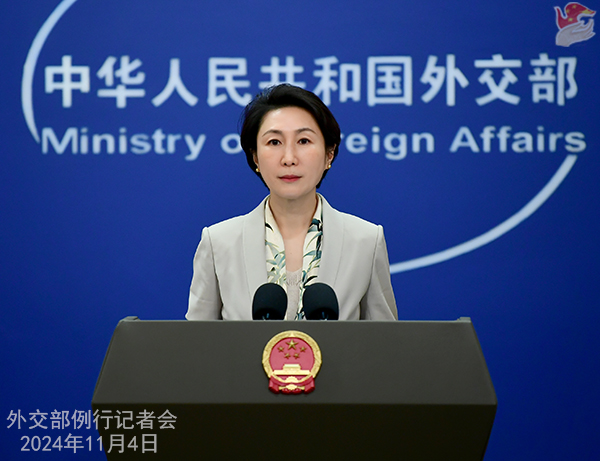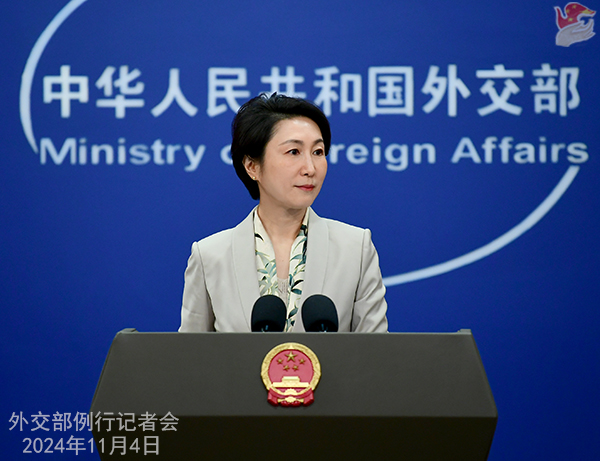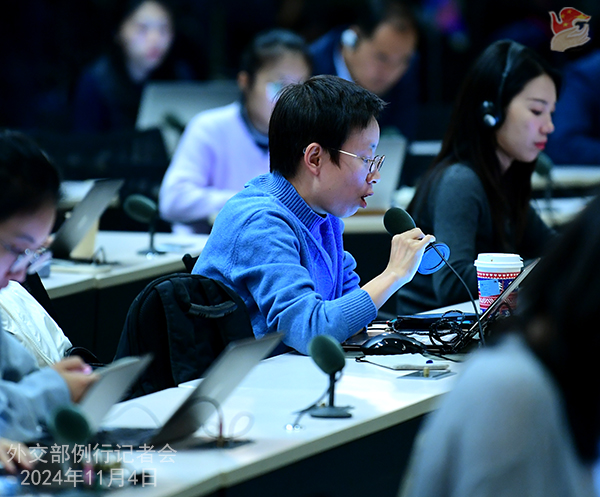
The eighth Greater Mekong Subregion Summit will be held in Kunming, Yunnan from November 6 to 7. Premier of the State Council Li Qiang will chair the summit. Leaders of the five Mekong countries of Cambodia, Lao PDR, Myanmar, Thailand and Viet Nam, and President of the Asian Development Bank will attend the summit upon invitation.
PTI: India has already announced that the disengagement has taken place in Depsang and Demchok areas, the two friction areas in the Eastern Ladakh, and also the patrolling has been resumed from Saturday. Do you have any comment on that? And also can you just elaborate on how China views the disengagement process that is currently on in that part of the Line of Actual Control?
Mao Ning: The Chinese and Indian troops are implementing the resolutions that the two sides reached on issues concerning the border area, which is going smoothly at the moment.
CCTV: You just announced that Premier Li Qiang will attend the eighth Greater Mekong Subregion (GMS) Summit. Could you share with us the background of this meeting and China’s expectations for it?
Mao Ning: From November 6 to 7, the eighth Greater Mekong Subregion (GMS) Summit will be held in Kunming, Yunnan. Premier Li Qiang will attend and chair the meeting, which is under the theme “Toward a Better Community Through Innovation-driven Development.”
Since its inception over three decades ago, with the concerted efforts of the six GMS member countries, namely China, Cambodia, Laos, Myanmar, Thailand and Viet Nam as well as the Asian Development Bank, the GMS has vigorously advanced coordinated economic and social development and regional integration, bringing tangible benefits to people of these countries. In a world facing sluggish economic recovery and geopolitical turbulence, it is all the more important for us to strengthen solidarity and cooperation and focus on development and prosperity. Through this summit, China hopes to have in-depth exchanges with other parties, with emphasis on openness, innovation, connectivity and coordination, strive for new progress in cooperation in key areas including regional connectivity, trade and investment, agriculture and poverty alleviation, and make greater contributions to promoting sustainable development and economic integration in the region.
TASS: The counting of votes in the second round of Moldova’s presidential election is almost completed, and incumbent President Maia Sandu has won 55 percent of the votes, according to reports. What is China’s comment? What expectations does China have for the future of its relations with Moldova?
Mao Ning: Moldova is China’s friendly partner. China has all along respected the choice of Moldova’s people and sincerely hopes that the country will remain stable and enjoy prosperity. China is willing to work with Moldova to advance the sustained growth of bilateral relations.
Bloomberg: We’ve seen reports that Japan’s national security adviser is visiting China and on that trip he is working for high-level interactions between the two countries. Can the Ministry confirm this visit? Are there plans for such high-level interactions?
Mao Ning: Secretary General of Japan’s National Security Secretariat Takeo Akiba is visiting China. Member of the Political Bureau of the CPC Central Committee and Director of the Office of the Central Commission for Foreign Affairs Wang Yi had a new round of China-Japan high-level political dialogue with him this morning. We will release timely information on that. Please check back for updates.

China Daily: In Botswana’s presidential election on October 30, Duma Boko, president of the Umbrella for Democratic Change, was elected as Botswana’s new President and was sworn in on November 1. Does China have any comment on that?
Mao Ning: Our congratulations to Botswana on its smooth presidential election and to Mr. Duma Boko on being elected and sworn in as President of Botswana. We wish Botswana every success in national development under the leadership of President Duma Boko.
Botswana is China’s important partner in southern Africa. The two countries share profound traditional friendship and enjoy fruitful practical cooperation, which has brought enormous benefit to the two peoples. China stands ready to work with Botswana, through implementing the outcomes of FOCAC Beijing Summit, to enhance political mutual trust and strengthen practical cooperation in various fields for positive progress in China-Botswana strategic partnership.
AFP: North Korea’s Foreign Minister Choe Son Hui said in Moscow on Friday that North Korea will stand by Russia until its victory in Ukraine. Does China have any comment on this?
Mao Ning: On the bilateral exchanges between Russia and the DPRK, we made clear our position more than once. On the Ukraine crisis, China’s position is consistent and clear.
Global Times: According to reports, Palau’s incumbent President Surangel Whipps, who is also a candidate for the general election, claims that China has been ratcheting up pressure and asked him to sever the country’s “diplomatic relations” with Taiwan. Reports also said that another candidate Tommy Esang Remengesau Jr. denied analysis and comments labeling him as pro-China. Do you have any comment?
Mao Ning: Around the world, 183 countries have already established diplomatic relations with China on the basis of the one-China principle. The prevailing historical trend of endorsing the one-China principle is unstoppable. Only a very small number of countries in the world, including Palau, still maintain the so-called “diplomatic relations” with the Taiwan region. Such practice not only goes against the interests of these countries and their people and against UNGA Resolution 2758, but also violates China’s sovereignty, and thus needs to be corrected.
China urges these countries to fulfill their obligations under international law, stand on the right side of history and make right decisions that truly serve their fundamental and long-term interests at an early date. As a Chinese idiom goes, “those who suit their actions to the times are wise.” It will be welcome for China to see people with vision in these countries to recognize the prevailing trend of history and the times and respect China’s sovereignty and territorial integrity and choose to stand on the right side of international fairness and justice at an early date. It’s never too late to make new friends. China stands ready to open up new chapters for relations with these countries on the basis of the one-China principle.
